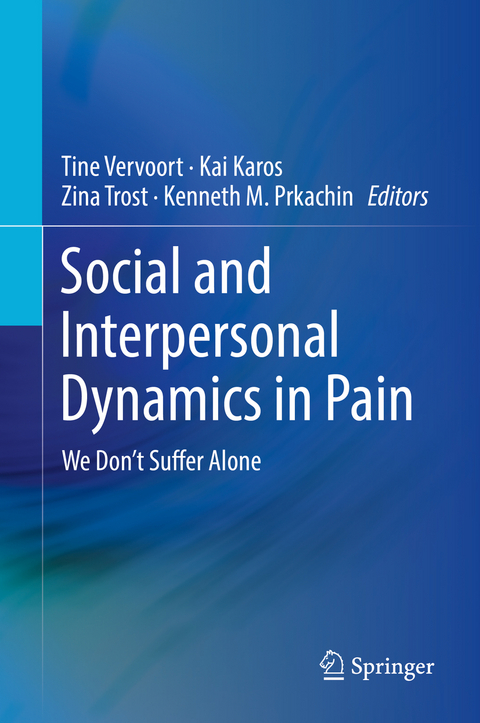
Social and Interpersonal Dynamics in Pain
Springer International Publishing (Verlag)
978-3-319-78339-0 (ISBN)
Among the topics covered:
Why do we care? Evolutionary mechanisms in the social dimension of pain.
When, how, and why do we express pain?
On the overlap between physical and social pain.
Facing others in pain: why context matters.
Caregiving impact upon sufferers' cognitive functioning.
Targeting individual and interpersonal processes in therapeutic interventions for chronic pain.
Social and Interpersonal Dynamics in Pain will be a valuable resource for clinicians who deal in pain practice and management, as well as for students and researchers interested in the social, interpersonal, and emotional variables that contribute to pain, the processes with which pain is associated, and the psychology of pain in general.
Tine Vervoort, PhD, is a Research Professor at the Department of Experimental-Clinical and Health Psychology, Ghent University, Belgium. Dr. Vervoort came to her career as a research psychologist interested in pediatric psychology with a background in psychiatric (child/adolescent) nursing and clinical psychology. Having completed her PhD in clinical psychology on social determinants of child pain expression she has systematically conceptualized the dynamic interaction between children in pain and caregivers in terms that facilitate empirical study of family socialization and social context as determinants of child pain experience. Drawing upon an affective-motivational account of pain, she has developed a theoretically integrative and clinically informative program of research addressing (1) the nature and (social) determinants of child (facial) pain expression/ pain experience; (2) emotion regulatory function of child pain-related attention and behavioral impact; (3) the nature and role of observer emotion regulation in understanding observers' emotional and behavioral responses; and, most recently, (4) the nature and role of parental injustice appraisals in the context of their child's pain. Her work has been presented at numerous international congresses and published within internationally peer-reviewed papers. She is likewise the recipient of a number of prestigious national and international awards/grants. She is also the proud mother of 4 boys. Kai Karos is a PhD student at the Research Group for Health Psychology at the KU Leuven, Belgium. He received his bachelor in psychology from Maastricht University in 2009 and finished the research master in psychopathology at Maastricht University in 2012. His research concerns the effects of threatening interpersonal environments on the experience and expression of pain. Drawing from social, evolutionary, learning and helath psychology, he is interested how interpersonal threat affects facial expression of pain, self-reported pain ratings, learning of pain-related fear, and interpersonal processes such as aggression and empathy. Moreover, he developed a theoretical, motivational framework which outlines how acute and chronic pain challenge several interpersonal human needs such as the need to belong, the need for autonomy, and the need for justice. His work has been presented at several international congresses and published within internationally peer-reviewed papers. Zina Trost, PhD, received her Bachelor's in Psychology in 2003 from Fordham University in New York City, where she grew up after her family immigrated from St. Petersburg, Russia in 1991. She received her doctorate in Clinical Health Psychology from Ohio University where she first began to explore her interests in chronic pain and illness, subsequently completing an internship at the University of Washington Medical Center, and postdoctoral fellowship at McGill University in Montreal, Canada. Dr. Trost's research addresses how individuals cope with pain and physical trauma - specifically cognitive, emotional, and behavioral responses to pain that can contribute to disability or facilitate positive adjustment, as well as the potential modulating influence social, cultural, and contextual factors. Her work uses both clinical and laboratory paradigms to examine the mechanisms and impact of psychological constructs such as pain-related fear, catastrophizing, and perceptions of injustice among individuals with pain, injury, and illness. Dr. Trost's recent work has adapted virtual reality and gaming technologies (including augmented reality and simulation) to aid in pain coping and rehabilitation among individuals with chronic pain and physical trauma, in particular spinal cord injury. She is working on harnessing these technologies to examine interpersonal processes in the context of pain and illness. Dr. Trost h
Preface.- Part I: Theoretical Foundations.- Chapter 1: Why Do We Care? Evolutionary Mechanisms in the Social Dimension of Pain.- Chapter 2: Toward the Social Communication Model of Pain.- Chapter 3: Developmental Dimensions in Understanding Interpersonal Features of Pain.- Chapter 4: An Affective-Motivational Account of Interpersonal Dynamics in Pain.- Part II: A Science of Pain Expression.- Chapter 5: Pain Behaviour: Unitary or Multidimensional Phenomenon?.- Chapter 6: When, How and Why Do We Express Pain?.- Chapter 7: Automatic, Objective, and Efficient Measurement of Pain Using Automated Face Analysis.- Part III: The Neuroscience of Interpersonal Pain Dynamics.- Chapter 8: The Neural Signature of Empathy for Physical Pain... Not Quite There Yet!.- Chapter 9: On the Overlap between Physical and Social Pain.- Chapter 10: Bridging the Gap between People and Animals: The Roots of Social Behavior and its Relationship to Pain.- Part IV: Effects of Facing Others in Pain.- Chapter 11: The Spectrum of Third-Person Pain: From Observation to Action.- Chapter 12: Facing Others in Pain: Why Context Matters.- Part V: Observer Responses to Others' Pain.- Chapter 13: Beyond Operant Theory of Observer Reinforcement of Pain Behavior.- Chapter 14: The Role of Non-Verbal Features of Caregiving Behaviour.- Chapter 15: Interpersonal Pain Dynamics in Couples: Interactions between Spouses' Physical Health Predict Caregiver Outcomes.- Chapter 16: Caregiving Impact Upon Sufferers' Cognitive Functioning.- Part VI: Across the Lifespan.- Chapter 17: Pain in Infancy: The Primacy of the Social Context.- Chapter 18: An Ecological and Lifespan Approach of Social Influences on Childhood Pain Experiences.- Chapter 19: Pain in Older Adults: Caregiver Challenges.- Part VII: Societal Context.- Chapter 20: Sex and Gender as Socio-Cultural Factors in Pain.- Chapter 21: Race and Pain: A Dual Injustice.- Part VIII: Towards Change: Targets and Methods for Intervention.- Chapter 22: Towards Change: Targeting Individual and Interpersonal Processes in Therapeutic Interventions for Chronic Pain.- Part IX: Conclusion.- Chapter 23: Where We've Been, Where We're At, Where Do We Go From Here?.
| Erscheinungsdatum | 14.07.2018 |
|---|---|
| Zusatzinfo | XIX, 532 p. 22 illus., 16 illus. in color. |
| Verlagsort | Cham |
| Sprache | englisch |
| Maße | 155 x 235 mm |
| Gewicht | 985 g |
| Themenwelt | Geisteswissenschaften ► Psychologie ► Psychoanalyse / Tiefenpsychologie |
| Geisteswissenschaften ► Psychologie ► Sozialpsychologie | |
| Medizin / Pharmazie ► Medizinische Fachgebiete ► Schmerztherapie | |
| Schlagworte | Affective-Motivational Models of Pain • Clinical Experience of Pain Sufferers • comparative cognition and pain • Evolution of Pain • Gate Control Theory of Pain • neonatal care and pain • neuroscience of empathy • Neuroscience of Pain • Observer Response in Pain • Pain Behavior • Pain Communication • Pain Expression • sex differences in pain |
| ISBN-10 | 3-319-78339-4 / 3319783394 |
| ISBN-13 | 978-3-319-78339-0 / 9783319783390 |
| Zustand | Neuware |
| Haben Sie eine Frage zum Produkt? |
aus dem Bereich


